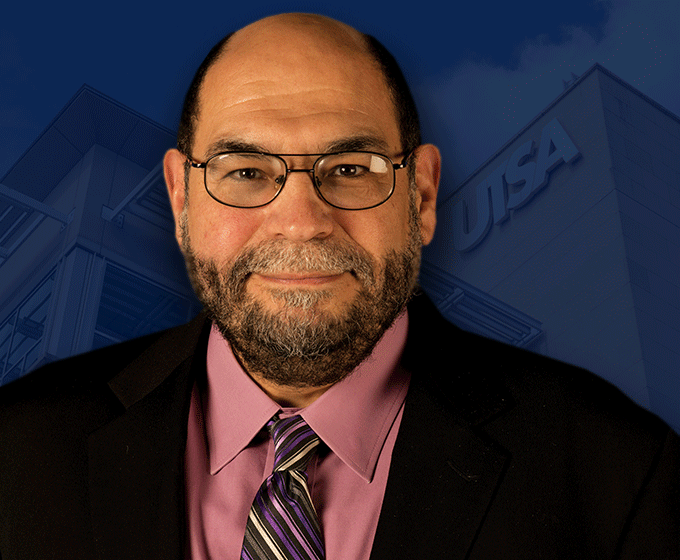
MAY 4, 2022 — Rogelio Sáenz, a professor in the UTSA Department of Demography, has been selected for membership to the Census Scientific Advisory Committee (CSAC). Sáenz has spent his career examining census data and methods, and his appointment will help the committee measure all populations properly to disburse federal funds.
The CSAC is a 21-member board appointed by the director of the Census Bureau. The committee provides recommendations on the design, operation and implementation of Bureau programs. It also aims to address emerging Census challenges including demographic, economic and statistical research, adaptive design, cyber infrastructure, and technical and operational priorities.
“I am extremely honored to have been selected to serve on this major Census Bureau committee,” Sáenz said. “From the time that I was an undergraduate student, I have worked closely with Census data, and I am very pleased to work in this capacity.”
Planning for the 2030 Census is well underway. The Census Bureau’s ability to develop a system that offers a more complete count of the nation’s population is a high priority—especially for groups that traditionally have been undercounted to a significant degree, including Native Americans, Latinos and African Americans.
“Dr. Sáenz has been chosen for this important role because of his expertise in Census data and methods,” said Lynne Cossman, dean of the UTSA College for Health, Community and Policy (HCaP). “His role on this board will be key in helping ensure that the nation is measuring all populations and measuring them properly.”
Sáenz is a sociologist and demographer in HCaP. He has written extensively on demography, Latina/os, race, inequality, immigration, COVID-19, health disparities, aging, public policy and social justice. He is the co-author of “Latinos in the United States: Diversity and Change” and the co-editor of the “International Handbook of the Demography of Race and Ethnicity.
Sáenz regularly writes op-eds and research briefs for various media and academic outlets throughout the country.
UTSA is a Tier One research university and a Hispanic Serving Institution (HSI) that is committed to tackling society’s grand challenges through world-class education and research programs. As an urban serving university, it is driving San Antonio’s knowledge economy, living out the notion that great universities need great cities and great cities need great universities.
Sáenz’s research is one example of the many programs underway at UTSA that seek to address the challenges of the urban population.
Last year, he was recognized with the 2021 Cox-Johnson-Frazier Award from the American Sociological Association. The year before, he received the Saber es Poder Academic Excellence Award from the University of Arizona’s Department of Mexican American Studies and.
In 2021, he was inducted to the UTSA Academy of Distinguished Researchers, which was established to select and honor outstanding faculty who are accomplished scholars and who share the university’s continuing commitment to research excellence.
UTSA Today is produced by University Communications and Marketing, the official news source of The University of Texas at San Antonio. Send your feedback to news@utsa.edu. Keep up-to-date on UTSA news by visiting UTSA Today. Connect with UTSA online at Facebook, Twitter, Youtube and Instagram.
Move In To COLFA is strongly recommended for new students in COLFA. It gives you the chance to learn about the Student Success Center, campus resources and meet new friends!
Academic Classroom: Lecture Hall (MH 2.01.10,) McKinney Humanities BldgWe invite you to join us for Birds Up! Downtown, an exciting welcome back event designed to connect students with the different departments at the Downtown Campus. Students will have the opportunity to learn about some of the departments on campus, gain access to different resources, and collect some giveaways!
Bill Miller PlazaJoin us for an intimate evening of cocktails, conversation, and culinary inspiration with Pati Jinich, Emmy-nominated chef and James Beard Award-winning author. Enjoy light bites and signature drinks in the warm, modern setting of Mezquite as Pati connects with guests over her passion for Mexican cuisine and storytelling.
Mezquite Restaurant in Pullman Market, 221 Newell Ave., San Antonio 78215From inspired courses to thoughtful pairings and a rich sense of community, the Ven a Comer Signature Dinner is a night of shared meals, shared stories, and unforgettable flavor.
Stable Hall (Pear Brewery), 307 Pearl Pkwy, San Antonio 78215Come and celebrate this year's homecoming at the Downtown Campus with food, games, giveaways, music, and more. We look forward to seeing your Roadrunner Spirit!
Bill Miller PlazaThe University of Texas at San Antonio is dedicated to the advancement of knowledge through research and discovery, teaching and learning, community engagement and public service. As an institution of access and excellence, UTSA embraces multicultural traditions and serves as a center for intellectual and creative resources as well as a catalyst for socioeconomic development and the commercialization of intellectual property - for Texas, the nation and the world.
To be a premier public research university, providing access to educational excellence and preparing citizen leaders for the global environment.
We encourage an environment of dialogue and discovery, where integrity, excellence, respect, collaboration and innovation are fostered.